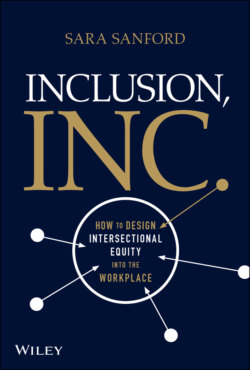Читать книгу Inclusion, Inc. - Sara Sanford - Страница 33
DEI: In Demand
ОглавлениеNot only is today's workforce more diverse, they also care about inclusion more than previous generations. A 2020 hiring survey revealed that 83 percent of Gen Z candidates prioritize a company's commitment to diversity and inclusion when choosing where to work.8 Ninety-four percent of millennials said they consider whether a business is an ethical employer before purchasing from them,9 and multicultural consumers comprise almost 40 percent of the total US population. Non-white consumers are expected to comprise the majority of the US population by 2040.10
It's not surprising that investors are following consumers. In 2014, Google released its first workforce diversity report, pressuring other companies to do the same. As more and more businesses followed Google's lead and released their own reports, researchers had a chance to answer a long-debated question: Do investors actually care if a company is diverse?
Margaret Neale, an organizational psychology professor at Stanford's School of Business, studied shareholder reactions to nearly 60 diversity announcements made by publicly traded firms between 2014 and 2018. The study was largely comprised of firms from the financial and tech sectors, including companies such as JPMorgan, BlackRock, eBay, and Facebook. The researchers measured each firm's stock returns on the day of their diversity announcements and found that stock prices increased more when higher levels of diversity were reported. In the tech sector specifically, investor support was even more positive when diversity numbers were higher than Google's.
When companies delivered reports in subsequent years that did not show any increase in diversity numbers, stock prices did not rise.
“This goes beyond saying diversity is a good idea because it's ethical,” Neale noted. “Shareholders are saying, ‘If you're not as diverse as we want you to be, there are going to be economic consequences.'”11
Investors are demanding more than just diverse representation. They're pushing companies to eradicate inequitable policies. Nia Impact Capital is one of many investor funds leading the charge by challenging Tesla to end its use of mandatory arbitration. Forced arbitration came under fire when the #MeToo and Black Lives Matter movements exposed how it's often used as a tool to stifle harassment and discrimination complaints. The Nia fund brought a proposal to the floor of Tesla's annual shareholder meeting, asking the electric car maker to prepare a report on its use of employee arbitration.12 When Tesla's board pushed back, several other institutional shareholders, including Calvert Research & Management, and proxy advisors Institutional Shareholder Services Inc. and Glass Lewis, stepped up to voice their support of the proposal.
Nia has also leveraged its assets to achieve progress elsewhere. In a celebrated decision, IBM accepted a Nia-led proposal to increase transparency around the company's workplace practices and report publicly on the effectiveness of its diversity, equity, and inclusion programs. The fund also succeeded in advocating for cybersecurity giant Fortinet to compile and release annual diversity reports.
Nia is just one example of the kinds of Environmental, Social, and Governance (ESG) funds that are pushing businesses to evolve. Investments in ESG funds doubled in 2020, accounting for 25 percent of US stock and bond mutual funds, a huge leap from the one percent share they held in 2014.13 Younger investors appear to be driving this shift, and their accumulating wealth will continue to follow companies that go beyond talk to meaningful action.
This undeniable demand, unfortunately, hasn't translated into impact. Reviewing GEN's national survey data, only 22 percent of employees believe that their employer has publicly stated DEI as a priority and has a clear roadmap for getting there. A 2020 study surveying over 800 HR professionals demonstrated similar findings: 76 percent of companies have no diversity or inclusion goals.14
As the workforce has changed, most companies' approaches still haven't, and this comes at a great cost.
